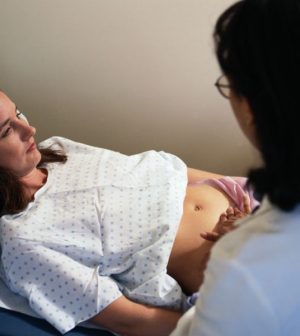- Could Your Grocery Store Meat Be Causing Recurring UTIs?
- Are You Making This Expensive Thermostat Error This Winter?
- Recognizing the Signs of Hypothyroidism
- 10 Strategies to Overcome Insomnia
- Could Artificial Sweeteners Be Aging the Brain Faster?
- Techniques for Soothing Your Nervous System
- Does the Water in Your House Smell Funny? Here’s Why
- Can a Daily Dose of Apple Cider Vinegar Actually Aid Weight Loss?
- 6 Health Beverages That Can Actually Spike Your Blood Sugar
- Treatment Options for Social Anxiety Disorder
Even Slightly Elevated Blood Pressure Early in Pregnancy a Bad Sign

Even a small increase in blood pressure during your first trimester could spell bigger trouble later in your pregnancy, new research suggests.
Those troubles can include gestational high blood pressure, which develops after the 20th week of pregnancy, and preeclampsia (high blood pressure and protein in the urine), the researchers explained.
Both conditions increase the risk for stroke in an expectant mother and for stillbirth, preterm birth and low birth weight. Preeclampsia also increases the risk of life-threatening seizures in the mother (eclampsia).
In this study, the researchers analyzed data from about 8,900 pregnant women in the United States. Of those who had elevated blood pressure in the first trimester (120/80 to 129/80 mm Hg), just over 30% developed a high blood pressure disorder of pregnancy. This was a 42% higher risk than among women with normal blood pressure (less than 120/80 mm Hg) in the first trimester.
Among women with stage 1 high blood pressure (130/80 to 139/89 mm Hg) in the first trimester, almost 38% developed a hypertensive disorder of pregnancy, which was an 80% higher risk than among those with normal blood pressure, the findings showed.
Stage 1 high blood pressure was associated with more than 2.5 times the risk for preeclampsia, according to the study.
An increase in blood pressure between the first and second trimester also increased the risk of a high blood pressure disorder of pregnancy, the investigators found.
For example, among women with normal blood pressure in the first trimester, an increase in systolic pressure (the top number) between the first and second trimester was associated with a 41% higher risk of a high blood pressure disorder of pregnancy, compared to women with a decrease in systolic pressure.
An increase in diastolic pressure (the bottom number) between the first and second trimester was associated with a 23% higher risk of trouble during pregnancy, compared to women who had a decrease in diastolic pressure during that time.
The U.S. National Institute of Child Health and Human Development-funded study was published June 27 in the American Journal of Obstetrics and Gynecology.
The findings suggest that blood pressure readings lower than those traditionally used to identify women as having high blood pressure may still be dangerous during pregnancy, study leader Dr. Alisse Hauspurg, from the University of Pittsburgh School of Medicine, said in an institute news release.
More information
The U.S. Centers for Disease Control and Prevention has more on high blood pressure during pregnancy.
Source: HealthDay
Copyright © 2026 HealthDay. All rights reserved.










